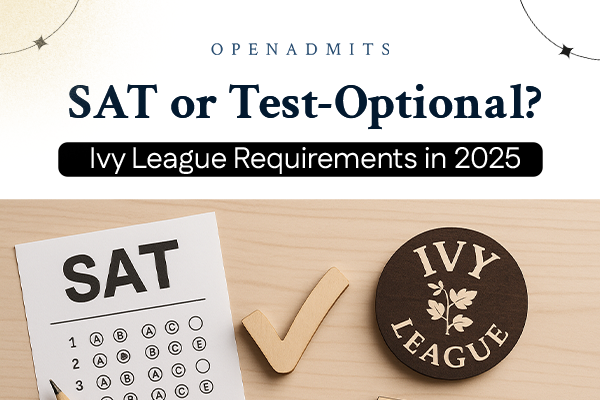SAT or Test-Optional? Ivy League Requirements in 2025
Harriny • 8th July, 2025
As the Ivy League admissions landscape shifts again in 2025, standardized testing is back in the spotlight but not every school is playing by the same rules. Here’s a quick breakdown of where each Ivy League university stands.
Take advantage of your FREE CALL with us now
1. The Resurgence of Standardized Testing in Ivy League Admissions – 2025 Update
After a pandemic-driven shift to test-optional (such as SAT/ACT) policies, standardized testing is making a comeback and the Ivy League is leading the charge.
1.1 Which Ivies Have Reinstated SAT/ACT?
As of the 2024–25 admissions cycle:
- Dartmouth was the first Ivy to bring back mandatory SAT/ACT scores
- Harvard, Yale, and Brown have quickly followed with similar announcements
- These universities now require students to submit SAT or ACT scores for admission consideration
Source: TOI
1.2 Test-Optional Ivy Holdouts (for Now)
As of now, only three Ivy League universities continue to be test-optional for 2025:
- Princeton University – Test-optional through Fall 2025
- Columbia University – Welcomes scores but won’t penalize if not submitted
- University of Pennsylvania (UPenn) – Test-optional for 2024-25 cycle
Important Note: Many of these schools previously made similar statements before reinstating test requirements. Policies can change suddenly.
Source: Forbes
Related article: Ivy League Universities Explained: Locations, and Scholarships
2.Test-Optional vs. Test-Blind: What’s the Difference?
Test-Optional
- **Are Scores Considered? **Submitting SAT/ACT scores is optional, but if provided, they will be considered
- Students with access to tutoring, test prep, and retakes
Test-Blind
- **Are Scores Considered? **SAT/ACT scores are not considered at all, even if submitted
- First-generation and underrepresented applicants
2.1 Why the Shift Back?
Two key reasons:
1. Grade Inflation Concerns:
With GPA averages rising across schools, it’s harder for admissions officers to differentiate truly high-achieving students.
2. Academic Readiness Gaps:
Schools like Yale noted that extracurriculars, essays, and GPAs alone don’t give a full picture of academic potential.
Test scores provide a standardized benchmark.
Must read: GPA Requirements for Ivy League Schools: What You Need to Succeed
3.What Changed in the Ivy League’s approach?
Cornell, the largest Ivy, is taking a phased and flexible approach to standardized testing, based on the distinct needs of its individual colleges.
3.1 Score-Free Colleges (No SAT/ACT Used at All):
Applicants to these Cornell schools won't have their test scores considered, even if submitted:
- College of Agriculture and Life Sciences
- College of Architecture, Art, and Planning
- Dyson School of Applied Economics and Management
- Nolan School of Hotel Administration
3.2 Test-Recommended Colleges (SAT/ACT Optional but Encouraged):
Applicants may benefit from submitting scores, though it’s not mandatory:
- College of Arts & Sciences
- College of Engineering
- College of Human Ecology
- Brooks School of Public Policy
- School of Industrial and Labor Relations
Superscoring Policy: Cornell will consider your highest section scores across test attempts.
What’s Next? **Starting with students applying in fall 2025 for **fall 2026 enrollment, all Cornell colleges will require standardized testing.
4. Do Test-Optional Policies Really Promote Equity in Ivy League Admissions 2025?
Test-blind admissions have been shown to significantly boost applications from first-generation and underrepresented students.
➩ In contrast, test-optional policies, though flexible, still tend to favor students with access to expensive test prep and tutoring.
➩ Even high-performing students from marginalized communities felt uncertain about submitting scores under test-optional models.
➩ Key barriers to standardized testing included:
- High costs
- Limited access to prep resources
- Time constraints
➩ Only a few underrepresented students faced no barriers compared to their non-marginalized peers.
Test-optional policies may inadvertently amplify existing inequalities by rewarding privilege and discouraging confidence among those already marginalized.
In the Ivy League opportunities, test-blind policies may offer a fairer path forward.
Important article: How to Build a Winning Profile for Ivy League Colleges application in the U.S
5. Why Does This Matters for Ivy League Admissions?
With Ivy League requirements evolving, applicants must:
- Double-check the latest policy for each school and program
- Decide if submitting SAT/ACT scores could boost their application
- Understand the contextual review approach: test scores are just one part of a holistic review
No need to reinvent the wheel again. ❝Get into the Ivy League – the Einstein Way❞
● Application Planning
● AI-Enhanced + Human Expertise – A hybrid model combining technology with personal mentorship
● Mentorship from Ivy Insiders
📮 Let’s talk →
Take advantage of your FREE CALL with us now
← Return home